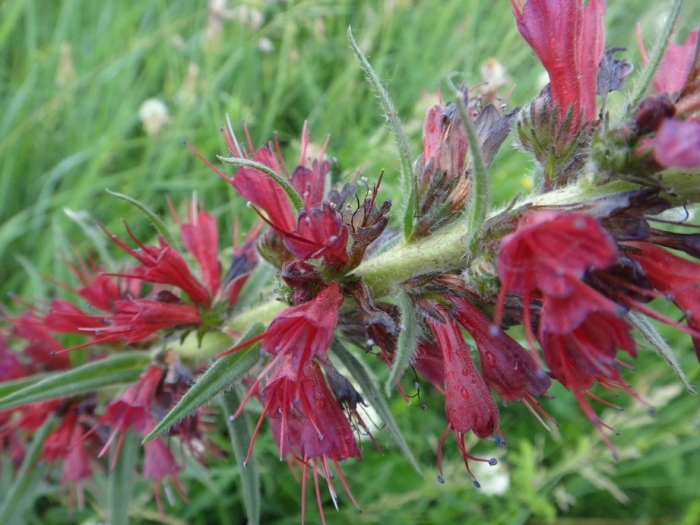Purple Viper’s Bugloss
(Pontechium maculatum)
Purple Viper’s Bugloss (Pontechium maculatum)
/
/

Aleksey Baushev
CC BY 4.0
Image By:
Aleksey Baushev
Recorded By:
Copyright:
CC BY 4.0
Copyright Notice:
Photo by: Aleksey Baushev | License Type: CC BY 4.0 | License URL: http://creativecommons.org/licenses/by/4.0/ | Rights Holder: Aleksey Baushev | Publisher: iNaturalist | Date Created: 2013-06-01T17:29:48-07:00 |
























Estimated Native Range
Summary
Pontechium maculatum, commonly known as Purple Viper’s Bugloss or Paterson’s Curse, is a semi-deciduous perennial herb native to Eastern Europe and the Caucasus. It thrives in a variety of habitats including open woodlands, coastal areas, and disturbed sites such as roadsides and pastures. This species is particularly well-adapted to dry, sandy soils and is often found in fields and grasslands. It typically grows rapidly to a height of 1-3 feet (0.3-0.9 meters) and a width of 1-2 feet (0.3-0.6 meters), with a rosette of hairy leaves at the base and erect stems.
Pontechium maculatum is known for its vibrant purple or pink flowers that bloom in the summer and are highly attractive to bees and other pollinators. The flowers are showy and arranged in a spike, making it a popular choice for ornamental gardens. It is often used in wildflower mixes and as a border plant due to its striking color and ease of maintenance. In cultivation, it requires full sun and well-drained sandy or loamy soils, and it is drought-tolerant once established. While it is not a heavy feeder, it can benefit from occasional fertilization. Gardeners should be aware that in some regions, particularly Australia, it is considered an invasive species and can outcompete native plants.CC BY-SA 4.0
Pontechium maculatum is known for its vibrant purple or pink flowers that bloom in the summer and are highly attractive to bees and other pollinators. The flowers are showy and arranged in a spike, making it a popular choice for ornamental gardens. It is often used in wildflower mixes and as a border plant due to its striking color and ease of maintenance. In cultivation, it requires full sun and well-drained sandy or loamy soils, and it is drought-tolerant once established. While it is not a heavy feeder, it can benefit from occasional fertilization. Gardeners should be aware that in some regions, particularly Australia, it is considered an invasive species and can outcompete native plants.CC BY-SA 4.0
Plant Description
- Plant Type: Herb
- Height: 1-3 feet
- Width: 1-2 feet
- Growth Rate: Rapid
- Flower Color: Purple, Pink
- Flowering Season: Summer
- Leaf Retention: Semi-deciduous
Growth Requirements
- Sun: Full Sun
- Water: Low
- Drainage: Medium, Fast
Common Uses
Bee Garden, Border Plant, Butterfly Garden
Natural Habitat
Open woodlands, coastal areas, disturbed sites, fields, and grasslands
Other Names
Common Names: Viper’s Bugloss, Paterson’s Curse, Purple Viper’s Bugloss
Scientific Names: , Pontechium maculatum, Echium clavatum, Echium clavatum, Echium creticum, Echium creticum, Echium diffusum, Echium diffusum, Echium italicum, Echium kochii
GBIF Accepted Name: